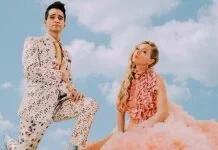Fashion trends change pace and even flip to completely different aesthetics with the bat of an eye. Big conglomerates like Forever 21, H&M, Urban Outfitters and more support this convenient business model by overturning clothes as quickly as possible with mass production rather than having seasonal lines. While fashion is a beautiful art form and a unique and empowering way to express oneself, this practice doesn’t fare well for workers’ rights and leaves a huge footprint on the environment as well as a massive amount of clothing waste.

Although we as consumers succumb to these pressures and standards from the industry, it’s been a steady and fast growing trend to buy ‘vintage’ or thrifted clothing. This is a great practice to reduce waste and sustainably consume resources, and thrift shops and the option to buy second hand discounted clothing are imperative sectors of this industry. They give people who may not have the resources readily available to buy first-hand clothing the ability to clothe themselves with items of equal quality.

In recent years, however, buying vintage has evolved to take on a different meaning. Maybe the glorification started with the release of Macklemore’s infamous single “Thrift Shop,” but you essentially can’t even give out a compliment anymore without hearing the response, “Thanks, it’s thrifted.” (Mind you, it’s actually a $200 recycled denim jacket.) See some nice Levi’s? They might be marketed as “vintage,” but I’ll bet you they were manufactured in the early 2000s. This begs the question: how do we even define these words? Why are we using them as a vehicle for pride rather than to showcase sustainable living, and what’s at stake in this redefinition?

With this glorification and excessive fraternization with these terms, I think it’s time to reevaluate how we treat our consumption and style choices. It’s okay to buy something labeled as “vintage” from Urban Outfitters if that’s what suits your style, but it’s time to address the fact that Urban is capitalizing off of a trend that has grown out of an actual need. Unsurprisingly, the big conglomerate is taking advantage of its consumers, but on our end I think we have a responsibility to buy vintage/thrifted as a sustainable and affordable alternative, and the reasoning shouldn’t solely be just to brag that it’s a vintage item. What’s worse than buying new clothing that uses a lot of resources just to get into your hands is disenfranchising a service and economy that means everything to some people and makes for a better world.

Ultimately, second-hand shopping is an awesome way to go. But rather than making it a colloquial trend that yields bragging rights, let’s make it a lifestyle to create a more equitable and sustainable world for our workers, peers, and greater community.





![Macklemore-Ryan-Lewis-Thrift-Shop-still-billboard-650-1548[1]](/wp-content/uploads/2017/09/Macklemore-Ryan-Lewis-Thrift-Shop-still-billboard-650-15481-1068x706.jpg)






